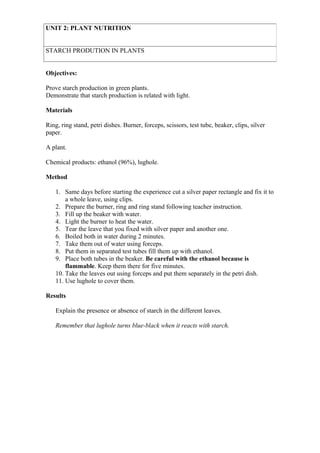Plant nutrition
•Download as DOC, PDF•
0 likes•171 views
1) This document outlines an experiment to demonstrate that starch production in plants is related to light. 2) The experiment involves boiling leaves that were exposed to light and leaves covered with silver paper to block light in ethanol and testing them with iodine to check for the presence of starch. 3) The results will show whether starch is present or absent in the leaves depending on their exposure to light during the experiment.
Report
Share
Report
Share

Recommended
Done by Polymers group, Mohamed bin AbdulAziz Almana
Food packaging is packaging for food. A package provides protection, tampering resistance, and special physical, chemical, or biological needs.
Now lots of products are made out of plastic. A lot of it is throw away and will stay in garbage dumps for thousands of years. Biodegradable plastic, unlike normal plastic made from petroleum, will decompose and become part of the soil. This Intractable will show you how one easy way to make some biodegradable plastic.
Then we can do with the biodegradable plastic a clever and eco-friendly food packaging systems on a high demand .Food Packaging, Eat your food , Grow a plant , Save the planet IDM8

Food Packaging, Eat your food , Grow a plant , Save the planet IDM8Qatar University- Young Scientists Center (Al-Bairaq)
Recommended
Done by Polymers group, Mohamed bin AbdulAziz Almana
Food packaging is packaging for food. A package provides protection, tampering resistance, and special physical, chemical, or biological needs.
Now lots of products are made out of plastic. A lot of it is throw away and will stay in garbage dumps for thousands of years. Biodegradable plastic, unlike normal plastic made from petroleum, will decompose and become part of the soil. This Intractable will show you how one easy way to make some biodegradable plastic.
Then we can do with the biodegradable plastic a clever and eco-friendly food packaging systems on a high demand .Food Packaging, Eat your food , Grow a plant , Save the planet IDM8

Food Packaging, Eat your food , Grow a plant , Save the planet IDM8Qatar University- Young Scientists Center (Al-Bairaq)
More Related Content
Similar to Plant nutrition
Similar to Plant nutrition (20)
More from davmartse
More from davmartse (20)
Plant nutrition
- 1. UNIT 2: PLANT NUTRITION STARCH PRODUTION IN PLANTS Objectives: Prove starch production in green plants. Demonstrate that starch production is related with light. Materials Ring, ring stand, petri dishes. Burner, forceps, scissors, test tube, beaker, clips, silver paper. A plant. Chemical products: ethanol (96%), lughole. Method 1. Same days before starting the experience cut a silver paper rectangle and fix it to a whole leave, using clips. 2. Prepare the burner, ring and ring stand following teacher instruction. 3. Fill up the beaker with water. 4. Light the burner to heat the water. 5. Tear the leave that you fixed with silver paper and another one. 6. Boiled both in water during 2 minutes. 7. Take them out of water using forceps. 8. Put them in separated test tubes fill them up with ethanol. 9. Place both tubes in the beaker. Be careful with the ethanol because is flammable. Keep them there for five minutes. 10. Take the leaves out using forceps and put them separately in the petri dish. 11. Use lughole to cover them. Results Explain the presence or absence of starch in the different leaves. Remember that lughole turns blue-black when it reacts with starch.